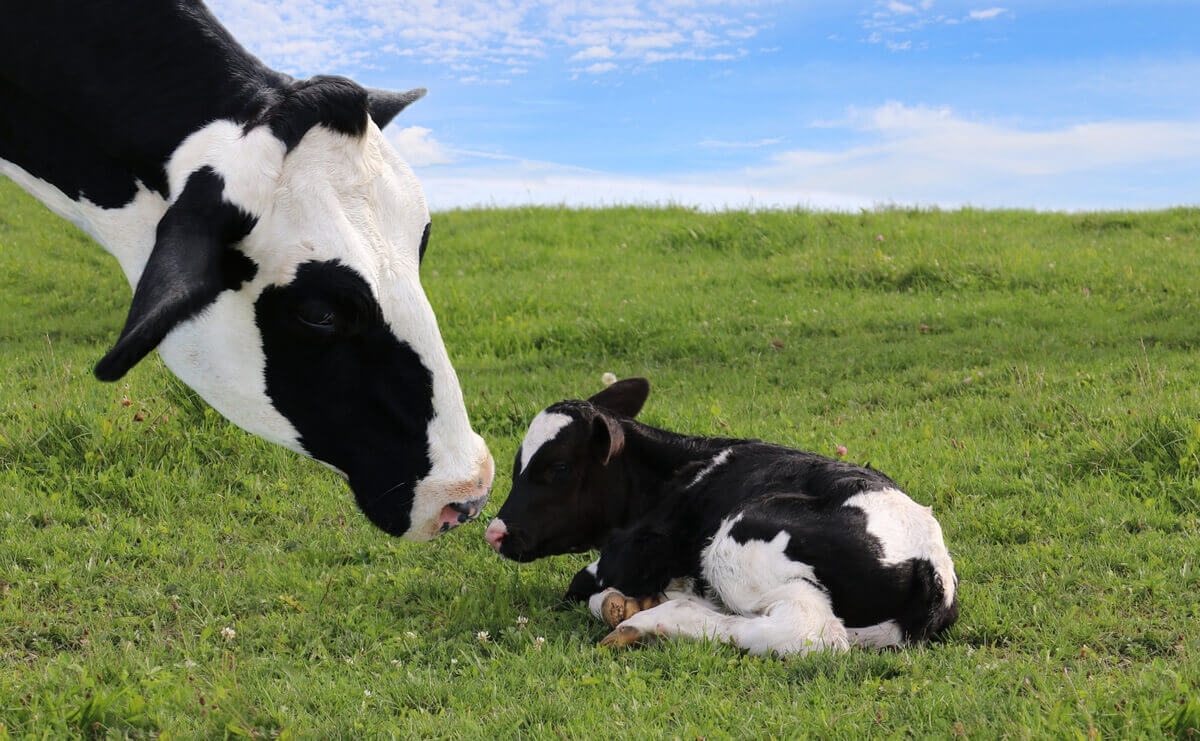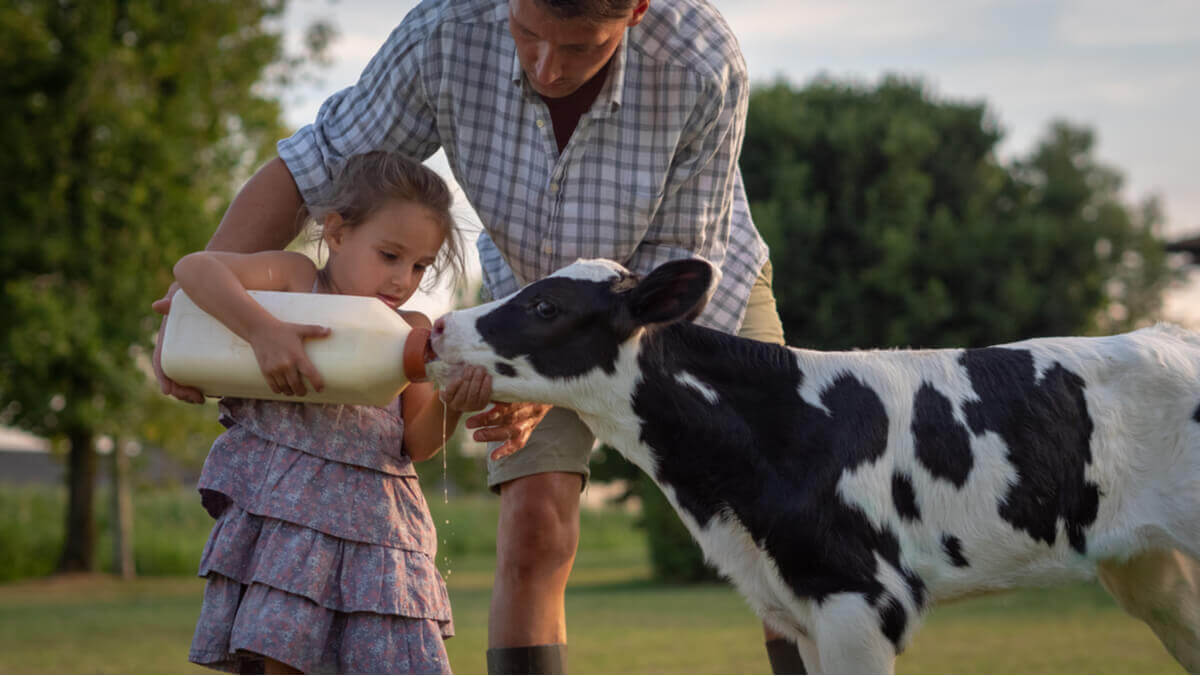Weaning and a Calf's Immune System


Written and verified by the vet Érica Terrón González
Weaning is when a calf stops feeding on its mother’s milk and begins to eat like an adult. As we all know, breast milk is essential for mammals during their first few months of life, and weaning can have a significant effect on a calf’s immune system.
However, despite this, many farmers have an interest in weaning calves early. Today, we’ll look at the implications of weaning on the calf’s immune system and other matters besides. Read on to find out more!
Important factors for weaning and a calf’s immune system
Before weaning, farmers need to take two key factors into consideration: the cow and the diet that the calf will need post-weaning. These will determine the most appropriate steps for the farmer to take.
The first months of a calf’s life
Once born, all mammals depend on their mother’s milk to get the nutrients they need. For cows, this relationship is even more complex, particularly when we consider that they have to develop a ruminant digestive system. This is because a calf’s stomachs undergo significant changes during the first few weeks of life.
- Immediately after being born, calves don’t use their first three stomachs, called the rumen, reticulum, and omasum. Their mother’s milk goes straight to the fourth stomach, the abomasum, and from there to the intestines. This means that, to begin with, calves digest food just like non-ruminant animals.
- Over the following weeks, the calf’s other stomachs begin to develop as their nutritional needs change. Once they’re about 100 days old, their mother’s milk can no longer provide them with all the nutrients they need.
- Once they’re five months old, grass is a much more suitable option for them and the mother begins to produce less milk anyway. This is normally when weaning begins.
If lactation continues longer than this time, this could wear out the mother and limit her chances of a post-partum recovery. This would have no benefits for either the mother or the calf.

The mother is responsible for her calf’s immune system during the first days of life
A cow’s nutritional needs are at their maximum during the first two months after giving birth. During this time, she produces increasingly more milk and her estrous cycles begin again.
However, after this period, she begins to produce less milk until the calf is weaned. As a result, her own nutritional needs reduce because she no longer has to produce milk rich in fat and energy for her calves.
In fact, as strange as it sounds, cows have greater nutritional requirements when feeding than when pregnant. As a result, the sooner the calf is weaned, the better for the cow and the farmer.
Feeding after weaning
Weaning calves makes it possible to make better use of the available pasture. Once the mother has stopped producing milk, she’s able to stay healthy with lower-quality forage, leaving the higher-quality grass for the calf to help them grow strong and healthy.
What are the advantages of early weaning?
As you can see, weaning is quite a complex topic, but weaning a calf early can bring benefits for the farmer:
- The mother can resume her reproductive cycle sooner.
- Reproductive cycles can be timed together, leading to a greater number of calves per reproductive period.
- There will be a shorter time between birth and conception of the next calf.
- The mother will physically recover quicker.
- The pasture land can be managed better.
How is the calf’s immune system affected?
For any animal, the immune system is important to deal with bacteria or viruses. When a pathogen enters an animal’s body, an army of white blood cells (lymphocytes) quickly surrounds it. These cells are a key part of the body’s immune response.
The problem is that mammals don’t have any white blood cells immediately after being born. Furthermore, even once they start to produce them, it takes a while before they can generate antibodies to fight bacteria and viruses. So, how does an animal fend off disease immediately after birth?
This is where passive immunity comes in, provided by colostrum, the first milk that the mother produces after birth. This milk provides the calves with the necessary antibodies to defend themselves against infection until their bodies are able to do it on their own.
So, quite clearly, early weaning will have an impact on the calf’s immune system.
Immunodeficiency in calves
Immunodeficient calves are calves that don’t have enough maternal antibodies. These animals will, unfortunately, be more at risk of catching dangerous infectious diseases during the first few weeks of life.
The main cause of immunodeficiency is not absorbing enough antibodies through the colostrum. So, anything that can improve this absorption will be beneficial, such as assisting the newborns with their first drink.

Finally, even though weaning can seem beneficial for the farmer and even for the mother, it demands caution, especially when it comes to the calf. For them, their mother’s milk is their first line of defense, so it’s important to take all possible factors into consideration before deciding to wean them.
All cited sources were thoroughly reviewed by our team to ensure their quality, reliability, currency, and validity. The bibliography of this article was considered reliable and of academic or scientific accuracy.
- Salado E, Fumagalli A. Destete [Internet]. Santiago del Estero; 2002 [cited 17 September 2020]. Available from: http://produccion-animal.com.ar/informacion_tecnica/destete/19-destete_SdelE.pdf
- Grognet J. La inmunidad del ternero [Internet]. Buenos Aires; 1997 [cited 17 September 2020]. Available from: http://produccion-animal.com.ar/informacion_tecnica/destete/08-inmunidad_del_ternero.pdf
- Destete precoz [Internet]. [cited 17 September 2020]. Available from: http://produccion-animal.com.ar/informacion_tecnica/destete/09-destete_precoz.pdf
- Correa Alarcón F. Estudio del desarrollo de los estómagos de los rumiantes [Internet]. Santiago de Cuba; 2006 [cited 17 September 2020]. Available from: http://www.produccion-animal.com.ar/informacion_tecnica/manejo_del_alimento/71-estomagos_rumiantes.pdf
- Ciclo estral [Internet]. Es.wikipedia.org. [cited 17 September 2020]. Available from: https://es.wikipedia.org/wiki/Ciclo_estral
- Forraje [Internet]. Es.wikipedia.org. [cited 11 September 2020]. Available from: https://es.wikipedia.org/wiki/Forraje
- Blanco Murcia F. Control y sincronización de celos para inseminación a tiempo fijo en ganado vacuno en extensivo [Internet]. Madrid; 2013 [cited 17 September 2020]. Available from: http://wwwsp.inia.es/Investigacion/OtrasUni/TransferenciaTecnologia/ForosINIA/VacCarne/Lists/Ponencias/Attachments/14/Javier%20Blanco%20UCM%20Veterinaria%20[Modo%20de%20compatibilidad].pdf
This text is provided for informational purposes only and does not replace consultation with a professional. If in doubt, consult your specialist.